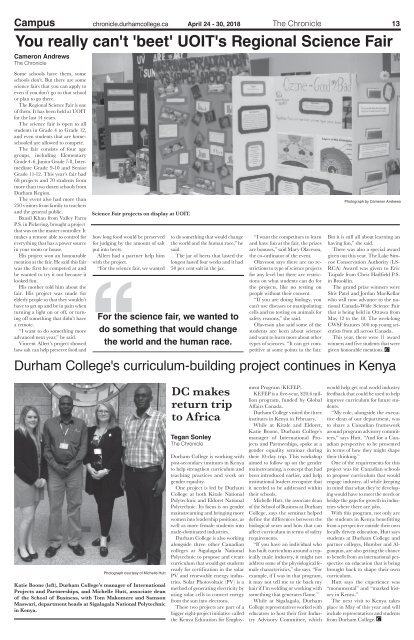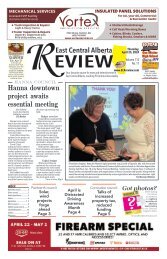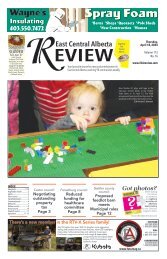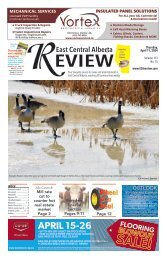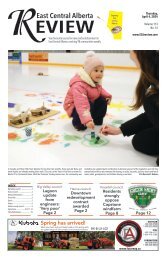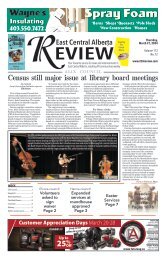Create successful ePaper yourself
Turn your PDF publications into a flip-book with our unique Google optimized e-Paper software.
Campus chronicle.durhamcollege.ca April 24 - 30, 20<strong>18</strong> The <strong>Chronicle</strong> 13<br />
You really can't 'beet' UOIT's Regional Science Fair<br />
Cameron Andrews<br />
The <strong>Chronicle</strong><br />
Some schools have them, some<br />
schools don’t. But there are some<br />
science fairs that you can apply to<br />
even if you don’t go to that school<br />
or plan to go there.<br />
The Regional Science Fair is one<br />
of them. It has been held at UOIT<br />
for the last 14 years.<br />
The science fair is open to all<br />
students in Grade 4 to Grade <strong>12</strong>,<br />
and even students that are homeschooled<br />
are allowed to compete.<br />
The fair consists of four age<br />
groups, including Elementary<br />
Grade 4-6, Junior Grade 7-8, Intermediate<br />
Grade 9-10 and Senior<br />
Grade 11-<strong>12</strong>. This year’s fair had<br />
68 projects and 70 students from<br />
more than two dozen schools from<br />
<strong>Durham</strong> Region.<br />
The event also had more than<br />
250 visitors from family to teachers<br />
and the general public.<br />
Baasil Khan from Valley Farm<br />
P.S. in Pickering, brought a project<br />
that was on the master controller. It<br />
makes a remote able to control for<br />
everything that has a power source<br />
in your room or house.<br />
His project won an honourable<br />
mention at the fair. He said this fair<br />
was the first he competed at and<br />
he wanted to try it out because it<br />
looked fun.<br />
His mother told him about the<br />
fair. His project was made for<br />
elderly people so that they wouldn’t<br />
have to get up and be in pain when<br />
turning a light on or off, or turning<br />
off something that didn’t have<br />
a remote.<br />
“I want to do something more<br />
advanced next year,” he said.<br />
Vincent Allert’s project showed<br />
how salt can help preserve food and<br />
Science Fair projects on display at UOIT.<br />
how long food would be preserved<br />
for judging by the amount of salt<br />
put into beets.<br />
Allert had a partner help him<br />
with the project.<br />
“For the science fair, we wanted<br />
to do something that would change<br />
the world and the human race,” he<br />
said.<br />
The jar of beets that lasted the<br />
longest lasted four weeks and it had<br />
50 per cent salt in the jar.<br />
For the science fair, we wanted to<br />
do something that would change<br />
the world and the human race.<br />
“I want the competitors to learn<br />
and have fun at the fair, the prizes<br />
are bonuses,” said Mary Olaveson,<br />
the co-ordinator of the event.<br />
Olaveson says there are no restrictions<br />
to type of science projects<br />
for any level but there are restrictions<br />
on what students can do for<br />
the projects, like no testing on<br />
people without their consent.<br />
“If you are doing biology, you<br />
can’t use diseases or manipulating<br />
cells and no testing on animals for<br />
safety reasons,” she said.<br />
Olaveson also said some of the<br />
students are keen about science<br />
and want to learn more about other<br />
types of sciences. “It can get competitive<br />
at some points in the fair.<br />
Photograph by Cameron Andrews<br />
But it is still all about learning an<br />
having fun,” she said.<br />
There was also a special award<br />
given out this year. The Lake Simcoe<br />
Conservation Authority (LS-<br />
RCA) Award was given to Eric<br />
Taipale from Chris Hadfield P.S.<br />
in Brooklin.<br />
The grand prize winners were<br />
Shiv Patel and Jordan MacKellar<br />
who will now advance to the national<br />
Canada-Wide Science Fair<br />
that is being held in Ottawa from<br />
May <strong>12</strong> to the <strong>18</strong>. The week-long<br />
CWSF features 500 top young scientists<br />
from all across Canada.<br />
This year, there were 11 award<br />
winners and five students that were<br />
given honorable mentions.<br />
<strong>Durham</strong> College's curriculum-building project continues in Kenya<br />
Photograph courtesy of Michelle Hutt<br />
Katie Boone (left), <strong>Durham</strong> College’s manager of International<br />
Projects and Partnerships, and Michelle Hutt, associate dean<br />
of the School of Business, with Tom Makomere and Samson<br />
Maswari, department heads at Sigalagala National Polytechnic<br />
in Kenya.<br />
DC makes<br />
return trip<br />
to Africa<br />
Tegan Sonley<br />
The <strong>Chronicle</strong><br />
<strong>Durham</strong> College is working with<br />
post-secondary institutes in Kenya<br />
to help strengthen curriculum and<br />
teaching practices and work on<br />
gender equality.<br />
One project is led by <strong>Durham</strong><br />
College at both Kitale National<br />
Polytechnic and Eldoret National<br />
Polytechnic. Its focus is on gender<br />
mainstreaming and bringing more<br />
women into leadership positions, as<br />
well as more female students into<br />
male-dominated industries.<br />
<strong>Durham</strong> College is also working<br />
alongside three other Canadian<br />
colleges at Sigalagala National<br />
Polytechnic to propose and create<br />
curriculum that would get students<br />
ready for certification in the solar<br />
PV and renewable energy industries.<br />
Solar Photovoltaic (PV) is a<br />
method of generating electricity by<br />
using solar cells to convert energy<br />
from the sun into electrons.<br />
These two projects are part of a<br />
bigger eight-project initiative called<br />
the Kenya Education for Employment<br />
Program (KEFEP).<br />
KEFEP is a five-year, $20.6 million<br />
program, funded by Global<br />
Affairs Canada.<br />
<strong>Durham</strong> College visited the three<br />
institutes in Kenya in February.<br />
While at Kitale and Eldoret,<br />
Katie Boone, <strong>Durham</strong> College’s<br />
manager of International Projects<br />
and Partnerships, spoke at a<br />
gender equality seminar during<br />
their 10-day trip. This workshop<br />
aimed to follow up on the gender<br />
mainstreaming, a concept that had<br />
been introduced earlier, and help<br />
institutional leaders recognize that<br />
it needed to be addressed within<br />
their schools.<br />
Michelle Hutt, the associate dean<br />
of the School of Business at <strong>Durham</strong><br />
College, says the seminar helped<br />
define the differences between the<br />
biological sexes and how that can<br />
affect curriculum in terms of safety<br />
requirements.<br />
“If you have an individual who<br />
has built curriculum around a typically<br />
male industry, it might not<br />
address some of the physiological female<br />
characteristics,” she says. “For<br />
example, if I was in that program,<br />
it may not tell me to tie back my<br />
hair if I’m welding or working with<br />
something that generates flame.”<br />
While at Sigalagala, <strong>Durham</strong><br />
College representatives worked with<br />
educators to host their first Industry<br />
Advisory Committee, which<br />
would help get real world industry<br />
feedback that could be used to help<br />
improve curriculum for future students.<br />
“My role, alongside the executive<br />
dean of our department, was<br />
to share a Canadian framework<br />
around program advisory committees,”<br />
says Hutt. “And for a Canadian<br />
perspective to be presented<br />
in terms of how they might shape<br />
their thinking.”<br />
One of the requirements for this<br />
project was for Canadian schools<br />
to propose curriculum that would<br />
engage industry, all while keeping<br />
in mind that what they’re developing<br />
would have to meet the needs or<br />
bridge the gaps for growth in industries<br />
where there are jobs.<br />
With this program, not only are<br />
the students in Kenya benefitting<br />
from a perspective outside their own<br />
locally driven education, Hutt says<br />
students at <strong>Durham</strong> College and<br />
partner colleges, Humber and Algonquin,<br />
are also getting the chance<br />
to benefit from an international perspective<br />
on education that is being<br />
brought back to shape their own<br />
curriculum.<br />
Hutt says the experience was<br />
“monumental” and “marked history<br />
in Kenya.”<br />
The next visit to Kenya takes<br />
place in May of this year and will<br />
include representatives and students<br />
from <strong>Durham</strong> College.


